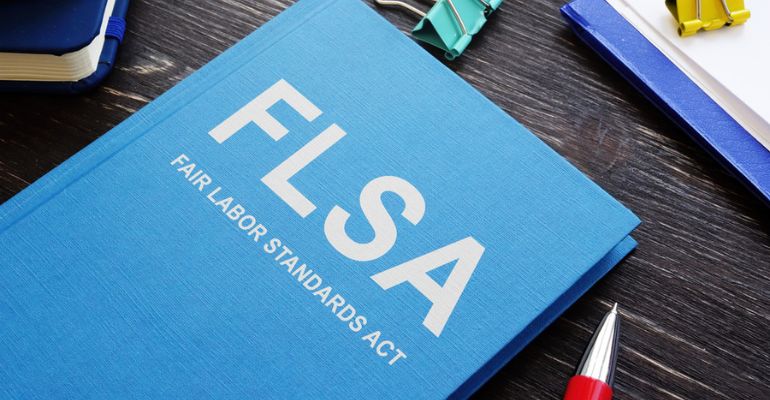
The Fair Labor Standards Act (FLSA) and Employee Rights
The Fair Labor Standards Act serves as a powerful protector of employee rights across Florida and the United States. Workers in many industries, from retail to hospitality and healthcare to manufacturing, have the FLSA on their side to ensure they get the pay they are entitled to as mandated by federal law.
What is the Fair Labor Standards Act (FLSA)?
The Fair Labor Standards Act of 1938 is legislation that established a minimum wage in the U.S. It continues to protect workers across the country. The parameters of the FLSA are enforced by the Department of Labor’s (DOL’s) Wage and Hour Division. Its intention is to protect workers from unfair pay practices by their employers.
The FLSA has seen updates over the years. The four primary standards set by the Fair Labor Standards Act include:
- Minimum wage requirements.
- Labor regulations regarding interstate commerce employment.
- Overtime pay requirements.
- Limitations on child labor.
It covers qualified employees paid by the hour or salary (under a certain amount).
Overtime
If you work more than 40 hours in one workweek and qualify for overtime under the Fair Labor Standards Act, you are entitled to “time and a half” of your regular wage for those additional hours. For example, if you earn $12.00/hour and work 50 hours in one workweek, you should receive $18.00/hour for those extra ten hours. Failure by your employer to abide by these FLSA guidelines violates the law.
Minimum Wage
The Fair Labor Standards Act guarantees the federal minimum wage of $7.25/hour. However, states that have their own minimum wage laws supersede the FLSA. In 2020, Florida voters approved Amendment 2, approving a gradual increase in minimum wage each year, beginning in 2021-2026. In Florida, the current minimum wage is $10.00/hour ($6.98/hour for tipped employees). Subsequent increases, beginning in September 2022, are:
- 2022: $11.00/hour or ($7.98/hour tipped wage)
- 2023: $12.00/hour or ($8.98/hour tipped wage)
- 2024: $13.00/hour or ($9.98/hour tipped wage)
- 2025: $14.00/hour or ($10.88/hour tipped wage)
- 2026: $15.00/hour or ($11.88/hour tipped wage)
There is a significant difference between the State of Florida and the federal minimum wage. When employers pay employees the federal and not the state minimum, this can add up to a tremendous amount of lost wages.
Important note: Minimum wage laws do not cover everyone, and the Fair Labor Standards Act does not protect many employees of smaller employers. Employees of businesses with gross revenue of less than $500,000 per year standardly do not have to pay the minimum wage, which is considered “enterprise” coverage.
However, employees of small employers may be covered “individually” under FLSA law. These are employees who are engaged in commerce or engaged in the production of goods for commerce.
As experienced FLSA attorneys, we have found that due to the liberal interpretation of the FLSA, most employees are subject to the FLSA’s individual coverage. Contact us for a free consultation if you believe your minimum wage rights have been violated.
What is FLSA Status?
FLSA status is when employees are considered either nonexempt or exempt from minimum wage rules and overtime pay. Your FLSA status will depend on your job duties and how much you get paid.
Generally speaking, “blue-collar” workers, emergency workers, law enforcement personnel, and other workers not in executive and managerial positions, as well as certain professionals, are considered nonexempt employees.
Who Is Exempt from FLSA?
There are five common FLSA exempt status categories. Some may be intuitive, and some may surprise you. These workers are paid more than minimum wage and are not eligible for overtime under the parameters of the Fair Labor Standards Act.
- Executives — including management with at least two full-time employees under your supervision, where you are involved in the decision-making process, such as hiring and firing; management of at least two full-time employees or their equivalent; and business owners, which are those that have at least a 20% investment in the business.
- Administrative positions — your duties would be “directly related to management or business operations.”
- Certain Professionals — including employees whose work requires “advanced knowledge and training.” Examples of exempt professionals are in legal, academic, or scientific fields. Creative professionals whose primary pursuit is artistic in nature are also not eligible.
- Certain Computer and Technical Professionals — earning at least $27.63/hour or at least $684 per week on a salary or fee basis, according to the definition in the Fair Labor Standards Act.
- Outside Sales Representatives — no salary basis but must (1) have primary duties as making sales, according to the definition in the Fair Labor Standards Act, or be involved in obtaining orders or contracts for services – or the use of facilities – that a client or customer is paying for; and (2) their duties are customarily performed away from the employer’s place of business.
Common Violations of the Fair Labor and Standards Act
There are three common violations of the Fair Labor Standards Act. Employees suffer the consequences when employers intentionally or mistakenly commit these violations.
- Misclassification —an employer misclassifies an employee as an independent contractor. Employers can control what work is being done and how for employees. Independent contractors can control the means and methods of how the work is being done to get the results. Independent contractors are not entitled to overtime pay or the minimum wage.
- Unpaid Wages — minimum wage violations, unpaid overtime, unauthorized deductions, unpaid business travel exceptions, substituting interns for employees, making employees work “off the clock,” and combining workweeks.
- Retaliation — mistreatment or another form of adverse employment action such as a demotion, a cut in pay, or termination after an employee objects to violations of the FLSA.
If your rights have been violated, you need to file an FLSA complaint to hold your employer accountable and receive a fair resolution, including any owed compensation.
How to File an FLSA Complaint
The Wage and Hour Division of the Department of Labor handles complaints about FLSA violations. The information you need includes
- basic personal information and company information,
- type of work,
- how and when you were paid, and
- any additional information, such as copies of pay stubs, personal records of hours worked, or other information on your employers’ pay practices.
When to Contact an FLSA Attorney
When filing a complaint, speaking to an FLSA attorney is highly recommended. With experienced legal representation, you can be confident that your claim is comprehensive, strong, and filed correctly.
Take action as soon as possible because there are statutes of limitations in filing a complaint about unpaid wages or other FLSA violations. Do not wait too long and lose the back pay that has been denied to you by your employer. If you are still with your employer, there are protections in FLSA law against retaliation. If you are no longer with the employer who you believe violated your rights, you can still file a claim if the statute of limitations has not expired.
Contact Wenzel Fenton Cabassa, P.A. today for a free, confidential consultation. We are the employee’s law firm, fighting tirelessly for workplace justice.
Please Note: At the time this article was written, the information contained within it was current based on the prevailing law at the time. Laws and precedents are subject to change, so this information may not be up to date. Always speak with a law firm regarding any legal situation to get the most current information available.








